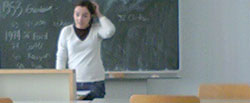
Popular Topics
Choose
Popular Links
| ElectoralSystemUS |
| History | Back to Page
Revision as of 2005-03-08 21:31 FrontPage > BwzNotes > BusinessEnglish2 > ElectoralSystemUS
Electoral System in USSophie painted us the big picture of the US electoral system. Basically, you have three branches.
The idea behind these three instances is, that there is the concept of check and balances. So, say, if the executive for some reason goes havock and wants to do things that Legislative and Judical do not want, he cannot do them. The Legislative BranchThe Congress represents the Legislative. What the congress does or does not depends on the Bill of Rights and the so called 10 amendments. You can find the Congress in Capitol Hill, Washington DC. The big joker of the Congress: it can override the veto of the Executive (the president). What does the Congress do? It has a couple of duties like
In fact, the vietnam apparently seems to have happend because of a decision of the congress. More about that later. The Congress consists of two parts The House of RepresentativesIt has 439 members, which depends on population. Every ten years, the population is recounted and the number of members adapted. The leading character in the House of Representatives is called The Speaker. The SenateConsists of 100 members. Every one of them must have been US citizen at least for 9 years as well as at least 30 years old. The Vice President of the United State is automatically President of the Senate. There's also a Prolempore President, which represents him in case of absence. The real power though is in the hands of the Majority Floor Reader. The Executive BranchConsists mainly of the president and the vice president, which are elected for four years. A president must be born in US, so that's bad cards for Mr. Schwarzenegger. Other members of the executive branch include the cabinet, the presidential office, the CIA, Nato and so on. While nations like France have a couple of candidates (in 2002, there were 16 of them), Americans only allow one member of each party to be voted for. The american presidential election is a somewhat tendious process that has three parts
It is "Win or Take All". In 1996, Bill Clinton had 361 presidential electors on his side. He won, even though he only had 49 percent of the popular votes. Some see that as problematic, it doesn't look very democratic to me. But what do I know.
No, I will not look up the oath in the Internet. Power of the presidentThe President has
Supreme CourtThe decisions of the court are final. It is the highest court and the last resourt. Before going to the Supreme Court, the cases have to be heard by lower courts. There is a two party system. If you look closely on the picture on top of this text, you might be able to see them. The Democratic party, which is the older one, has been founded in 1829. Their symbol is the donkey. The Republicans on the other hand have been founded in 1854 and have an elephant as their symbol. It is quiz time!
So, in case you want to travell back in time and boast with you knowledge: I have noted the answers below. Who was president when?
Notes of Mr. Gauster-FilekThe most important concept of the us electoral system is the Balance of Power, the so called checks and balances. No one of the three branches has absolute power! There's the
To some degree, the power of the individual body depends on how much they want to excercise their power. President Bush takes more power than for example President Carter did. Also it seems, that President Bush tries to change the republican party more and more to be like Mr. Bush it seems. Two years ago, Mr. Gauster-Filek would have seen the Republicans and the Democrats as two big tents. Both would contain Liberals (Lefts), Middle of the Road and Conservatives (Rights). Right now though, the situation is a different one. The Republicans are basically conservative. As well in political as in social matters. The Democrats on the other hand are more middle of the road / left. The DemocratsThe media and the public opinion right now identifies the Democrats with Minorities. That wouldn't be that bad if they wouldn't shoot themselves in the foot. Their good intentions are executed rather clumsy. The Democrats are identified with Gay Rights, Black Rights, and dozens of other minorities. But where's the average guy from the street? Add their afraidness of Bush to that and you know why they are loosing. The RepublicansBush was against Abortion and against the gay marriage / social contract during the elections. That gave strong majorities. What's more: US right now has a lot of old and sick justices / judges. The President, that's Mr. Bush, has the right to name new ones as soon as they are out of business. Btw. Justices are the ones in Supreme Court, judges those in the other courts. General Party behaviorIn the US, people don't have to follow what their party does. Different to Austria, independent opinions are possible. Also a hot issue: The reform of social security. Bush has an strong opinion here, but the rest will probably not follow. Why Schwarzenegger will not become US president? Because it would take to long, the constitution would have to be changed. But he could become Austrian president... (Note: Would he introduce death-penalty here? I would want to throw him out then).
|

 Wiki Toolbox
Wiki Toolbox



